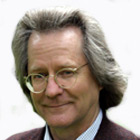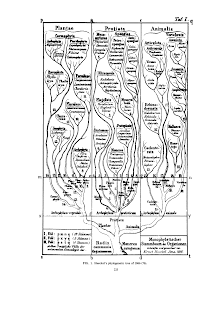Explanation of why Darwin was important and the theory of Evolution by Natural Selection..Source:
Atheist Movies file: Darwin and Darwinism.rtf
Darwin and Darwinismby Richard Dawkins
To most people through history it has always seemed obvious that the teeming diversity of life, the uncanny perfection with which living organisms are equipped to survive and multiply, and the bewildering complexity of living machinery, can only have come about through divine creation. Yet repeatedly it has occurred to isolated thinkers that there might be an alternative to supernatural creation. the notion of species changing into other species was in the air, like so many other good ideas, in ancient Greece. It went into eclipse until the 18th century, when it resurfaced in the minds of such advanced thinkers as Pierre de Maupertuis, Erasmus Darwin and the man who styled himself the Chevalier de Lamarck. In the first half of the 19th century the idea became not uncommon in intellectual circles, especially geological ones, but always in a rather vague form and without any clear picture of the mechanism by which change might come about. It was Charles Darwin (Erasmus's grandson) who, spurred into print by Alfred Russel Wallace's independent discovery of his principle of natural selection, finally established the theory of evolution by the publication, in 1859, of the famous book whose title is usually abbreviated to the Origin of Species.
We should distinguish two quite distinct parts of Darwin's contribution. He amassed an overwhelming quantity of evidence for the fact that evolution has occurred, and, together with Wallace (independently) he thought up the only known workable theory of the reason why it leads to adaptive improvement - natural selection.
Some fossil evidence was known to Darwin but he made more use of other evidence, less direct but in many ways more convincing, for the fact that evolution had taken place. the rapid alteration of animals and plants under domestication was persuasive evidence both for the fact that evolutionary change was possible and for the effectiveness of the artificial equivalent of natural selection. Darwin was particularly persuaded by the evidence from the geographical dispersion of animals. the presence of local island races, for example, is easily explicable by the evolution theory: the creation theory could explain them only by unparsimoniously assuming numerous 'foci of creation' dotted around the earth's surface. the hierarchical classification into which animals and plants fall so naturally is strongly suggestive of a family tree: the creation theory had to make contrived and elaborate assumptions about the creator's mind running along themes and variations. Darwin also used as evidence for his theory the fact that some organs seen in adults and embryos appear to be vestigial. According to the evolution theory such organs as the tiny buried hind-limb bones of whales are remnants of the walking legs of their terrestrial ancestors. In general the evidence for the fact that evolution has occurred consists of an enormous number of detailed observations which all make sense if we assume the theory of evolution, but which can be explained by the creation theory only if we assume that the creator elaborately set out to deceive us. Modern molecular evidence has boosted the evidence for evolution beyond Darwin's wildest dreams, and the fact of evolution is now as securely attested as any in science.
Turning from the fact of evolution to the less secure theory of its mechanism, natural selection, the mechanism that Darwin and Wallace suggested, amounts to the nonrandom survival of randomly varying hereditary characteristics. Other British Victorians, such as Patrick Matthew and Edward Blyth, had suggested something like it before, but they apparently saw it as a negative force only. Darwin and Wallace seem to have been the first to realise its full potential as a positive force guiding the evolution of all life in adaptive directions. Most previous evolutionists, such as Darwin's grandfather Erasmus, had inclined towards an alternative theory of the mechanism of evolution, now usually associated with Lamarck's name. This was the theory that improvements acquired during an organism's lifetime, such as the growth of organs during use and their shrinkage during disuse, were inherited. This theory of the inheritance of acquired characteristics has emotional appeal (for example to George Bernard Shaw in his Preface to Back to Methuselah) but the evidence does not support it. Nor is it theoretically plausible. In Darwin's time the matter was more in doubt, and Darwin himself flirted with a personalised version of Lamarckism when his natural selection theory ran into a difficulty.
That difficulty arose from current views of the nature of heredity. In the 19th century it was almost universally assumed that heredity was a blending process. On this blending inheritance theory, not only are offspring intermediate between their two parents in character and appearance, but the hereditary factors that they pass on to their own children are themselves inextricably merged. It can be shown that, if heredity is of this blending type, it is almost impossible for Darwinian natural selection to work because the available variation is halved in every generation. Darwin knew this, and it worried him enough to drive him in the direction of Lamarckism. It may also have contributed to the odd fact that Darwinism suffered a temporary spell of unfashionableness in the early part of the 20th century. the solution to the problem which so worried Darwin lay in Gregor Mendel's theory of particular inheritance, published in 1865 but unfortunately unread by Darwin, or practically anyone else until after Darwin's death.
Mendel's research, rediscovered at the turn of the century, demonstrated, what Darwin himself had at one time dimly glimpsed, that heredity is particulate, not blending. Whether or not offspring are bodily intermediate between their two parents, they inherit, and pass on, discrete hereditary particles - nowadays we call them genes. An individual either definitely inherits a particular gene from a particular parent or it definitely does not. Since the same can be said of its parents, it follows that an individual either inherits a particular gene from a particular grandparent or it does not. Every one of your genes comes from a particular one of your grandparents and, before that, from a particular one of your great grandparents. This argument can be applied repeatedly for an indefinite number of generations. Discrete single genes are shuffled independently through the generations like cards in a pack, rather than being mixed like the ingredients of a pudding.
This makes all the difference to the mathematical plausibility of the theory of natural selection. If heredity is particulate, natural selection really can work. As was first realised by the British mathematician G H Hardy and the German scientist W Weinberg, there is no inherent tendency for genes to disappear from the gene pool. If they do disappear, it will be because of bad luck, or because of natural selection - because something about those genes influences the probability that individuals possessing them will survive and reproduce. the modern version of Darwinism, often called Neodarwinism, is based upon this insight. It was worked out in the 1920s and 1930s by the population geneticists R A Fisher, J B S Haldane and Sewall Wright, and later consolidated into the synthesis of the 1940s known as Neodarwinism. the recent revolution in molecular biology, beginning in the 1950s, has reinforced and confirmed, rather than changed, the synthetic theory of the 1930s and 40s.
the modern genetic theory of natural selection can be summarised as follows. the genes of a population of sexually interbreeding animals or plants constitute a gene pool. the genes compete in the gene pool in something like the same way as the early replicating molecules competed in the primeval soup. In practice genes in the gene pool spend their time either sitting in individual bodies which they helped to build, or travelling from body to body via sperm or egg in the process of sexual reproduction. Sexual reproduction keeps the genes shuffled, and it is in this sense that the long-term habitat of a gene is the gene pool. Any given gene originates in the gene pool as a result of a mutation, a random error in the gene-copying process. Once a new mutation has been formed, it can spread through the gene pool by means of sexual mixing. Mutation is the ultimate origin of genetic variation. Sexual reproduction, and genetic recombination due to crossing over see to it that genetic variation is rapidly distributed and recombined in the gene pool.
Any given gene in a gene pool is likely to exist in the form of several duplicate copies, either all descended from the same original mutant, or descended from independent parallel mutants. therefore each gene can be said to have a frequency in the gene pool. Some genes, such as the albino gene, are rare in the gene pool, others are common. At the genetic level, evolution may be defined as the process by which gene-frequencies change in gene pools.
there are various reasons why gene-frequencies might change: immigration, emigration, random drift, and natural selection. Immigration, emigration, and random drift are not of much interest from the point of view of adaptation, although they may be quite important in practice. It is natural selection which accounts for the perfection of adaptation, for the complex functional organisation of life, and for such progressive qualities as evolution may (controversially) exhibit. Genes in bodies exert an influence on the development of those bodies. Some bodies are better at surviving and reproducing than others. Good bodies, i.e. bodies that are good at surviving and reproducing, will tend to contribute more genes to the gene pools of the future than bodies that are bad at surviving and reproducing: genes that tend to make good bodies will come to predominate in gene pools. Natural selection is the differential survival and differential reproductive success of bodies: it is important because of its consequences for the differential survival of genes in gene pools.
Not all selective deaths lead to evolutionary change. On the contrary, much natural selection is so-called stabilising selection, removing genes from the gene pool that tend to cause deviation from an already optimal form. But when environmental conditions change, either through natural catastrophe or through evolutionary improvement of other creatures (predators, prey, parasites, and so on), selection may lead to evolutionary change.
Evolution under the influence of natural selection leads to adaptive improvement. Evolution, whether under the influence of natural selection or not, leads to divergence and diversity. From a single ultimate ancestor, many hundreds of millions of separate species have, at one time or another, evolved. the process whereby one species splits into two is called speciation. Subsequent divergence leads to ever wider separation of taxonomic units - genera, families, orders, classes, etc. Even creatures as different as, say, snails and monkeys, are derived from ancestors who originally diverged from a single species in a speciation event.
Since the 1940s it has been widely accepted that the first step in the origin of species is normally geographical separation. A species is accidentally divided into two geographically separated populations. Often there may be sub-populations isolated on islands, where the word is generalised to include islands of water in land (lakes), islands of vegetation in deserts (oases) etc. Even trees in a meadow may be effective islands to some of their small inhabitants. Geographical isolation means no gene flow, no sexual contamination of each gene pool by the other. Under these conditions the average gene frequencies in the two gene pools can change, either because of different selection pressures or because of random statistical changes in the two areas, After sufficient genetic divergence while in geographical isolation, the two sub-populations are no longer capable of interbreeding even if later circumstances chance to re-unite them. When they can no longer interbreed, speciation is said to have occurred and a new species (or two) is said to have come into being. It is controversial whether geographical separation is always necessarily implicated in speciation.
Darwin made a distinction between natural selection, which favours organs and devices for survival, and sexual selection which favours competitive success in gaining mates, either by direct combat with members of the same sex, or by being attractive to the opposite sex (these are sometimes called intrasexual selection and intersexual selection, respectively, but the usage is misleading). Darwin was impressed by the fact that qualities of sexual attractiveness were often the reverse of qualities leading to individual survival. the gaudy and cumbersome tails of birds of paradise are a notorious example. they must hamper their possessors in flight, and certainly they are conspicuous to predators, but Darwin realised that this could be 'worth it' if the tails also attractive females. A male who manages to persuade a female to mate with him rather than with a rival is likely to contribute his genes to future gene pools. Genes for sexually attractive tails willy-nilly have an advantage that compensates for their admitted disadvantages.
the philosopher Daniel Dennett has written: "Let me lay my cards on the table. If I were to give an award for the single best idea anyone has ever had, I'd give it to Darwin, ahead of Newton and Einstein and everyone else." Comparative judgments like that are hard to make. But on one criterion Darwin's contribution surely heads the field. the sheer power of the idea, measured as the amount of explanatory work that it does, divided by the extreme simplicity of the idea itself, leaves one astonished that humanity had to wait till the mid nineteenth century before one of us thought of it.
A longer version of this article, authored by Richard Dawkins, first appeared in the British Edition of Microsoft(r) Encarta(r) Encyclopedia 98.











